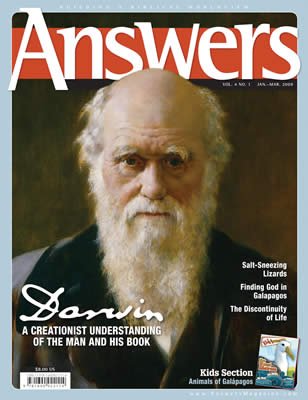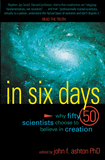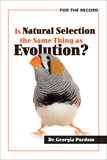Building a Community for Discovery
God is always at work, bringing glory to His name. When men like Darwin raise difficult questions that challenge popular conceptions about God, God always has an answer. God has given us dominion over the earth and expects His people to study His creation to find answers. He is at work today, building a community of faithful scientists who desire to discover how God filled the earth with such a cornucopia of species within His created “kinds.”
When building a house, you normally don’t do it alone. You seek out qualified help. Building a framework of knowledge about God’s diverse and intricate creation requires the same thing—working together. This great undertaking calls for innumerable specialists, such as biologists, geologists, ecologists, statisticians, theologians, educators, computer geeks, and even a few odd journalists with curious minds.
“We’re not just trying to answer some weird questions or refute the scoffers. Our goal is God Himself. We’re trying to understand His creation, His design, which ultimately is a reflection of His very nature. What better goal could there be?”
—Dr. Todd Charles Wood, President of the Creation Biology Study Group (BSG)
Since Darwin’s day, God has been pulling together specialists with the interests and talents to work through the questions that Darwin and his followers raised but never sufficiently answered. One contemporary leader in this effort is a relatively new research organization called the Creation Biology Study Group (BSG), a group of scientists and theologians with the common goal of understanding the life sciences from the Bible’s perspective of a recent creation. This group of independent researchers and teachers from various disciplines represents a whole new field of biology, known as baraminology. They are classifying organisms according to the biblical kinds (the groups of original animals alluded to in Genesis 1).
Their work goes far beyond figuring out which critters belong to which “kinds.” BSG strives to answer complex questions about biological design, natural evil (predators, parasites, pathogens, and poisons), the causes of speciation (the wide variety we see in each created kind), and biogeography (how plants and animals rapidly refilled the world after the Flood). These are some of the most fundamental questions that biologists—including Darwin—have faced.
I recently had the opportunity to observe this growing community of Christians at their annual conference, held last summer in Pittsburgh, Pennsylvania. I was a little nervous about what it would be like rubbing shoulders with such specialized scientists and theologians. My fears proved to be unfounded as I was immediately put at ease by their evident camaraderie and shared love for God and His Word.
Building a Community Together

Bible scholars like Doug Kennard help BSG members understand the implications of the Bible’s teachings that relate to biology. One important area of study includes the Hebrew concept of life and death. Indicators of life include breath, thought, choices, accomplishments, and movements, which would not include plants. Photo by Archie Carpenter.
God did not create man to live alone. He created us to work and worship together and to encourage and teach one another. In the various disciplines of modern science, collaboration and community are a necessity, but even more so for scientists who are Christians.
“Science, like all Christian activity, ought to be performed in a community,” Todd Wood, president of the BSG, shared with me. “Fellowship with other scientists and nurturing students should become prime goals of each scientist.”
Even before the group was founded in 1996, various individuals had already begun developing a creation model of biology that reveals more of the details of the world around us. From the start, they knew they needed to tap into the expertise of a larger community of specialists from fields as diverse as theology, geology, paleontology, microbiology, biogeography, biogeochemistry, and statistics. Biology provides only pieces of the bigger puzzle.
Because the first priority in every science discipline must be to understand what God’s Word says, theologians hold an important piece of the puzzle. Creation biologists are working with Hebrew scholars to understand the precise implications of the Bible’s teachings that relate to biology—the nature of the “kind,” what sort of changes arose after the Curse, and the very meaning of life itself.

Annual conferences provide a great forum for members of the Creation Biology Study Group (BSG) to present and discuss the latest research findings in creation biology. Kurt Wise, one of the BSG founders, answers questions about his latest research on baraminology and the fossil record of mammals. Photo by Archie Carpenter.
One of the founders of the BSG, Kurt Wise, is not even a biologist, technically speaking. He is a paleontologist who loves to study fossils. His interest in the status of creation biology is not surprising, however, because paleontology is built upon two other fields—biology (the study of living things) and geology (the study of rocks). After graduating from Harvard University in 1989, Wise felt that a more rigorous model of paleontology could not be built until creation biologists and geologists had refined their part of the creation model.
Convinced that baraminology could provide that necessary foundation, Wise and a group of like-minded scientists began corresponding in 1996 and then meeting regularly in 1999. Wise has worked with the other specialists, sharing what he is studying about the patterns of creatures in the fossil record, trying to determine what creature belongs to what kind. He believes the fossil record can give insight into how new species arose within created kinds after the Flood.
The field of creation geology is rapidly maturing right alongside biology. In fact, at last summer’s conference, the fledgling Creation Geology Group presented papers concurrent with the BSG. Various scientists in the BSG are excited about new insights that geologists may learn from the rock record, telling us about the different periods in earth history after the Flood.
Other fields are important to biology, too. Without expertise in mathematics and statistics, the field of baraminology might still be stuck at the starting gate. But improvements in statistical analysis have enabled baraminologists to begin quantifying the differences that appear to separate kinds.
Another field that has boosted baraminology’s usefulness in helping us understand life is microbiology (the study of microscopic organisms). Joe Francis, a microbiologist and professor at The Master’s College (near Los Angeles), admitted to me that he sometimes feels like the odd man out. After all, what do microbes have to do with animals and plants? But according to Francis, the more we learn, the more we see how they play an essential, supporting role in all of life. Several others in BSG are interested in pursuing more about the role of microbes, including Dr. Alan Gillen, a biology professor at Liberty University, and Dr. Georgia Purdom, an educator and speaker for Answers in Genesis.
Microbiologists estimate that 10 million species of unidentified bacteria fill the earth and interact with plants and animals in an incredibly complex and awe-inspiring web of life. They may even prove to play a role in the origin of the wide variety of animal and plant life (speciation) that fills the earth. Francis stated that this life-sustaining biomatrix reminds him just how much the triune Creator desires relationships.
Building on the Foundation Laid by Others
Like any other human enterprise, this group is not building from scratch. They are building on the work of the pioneers who came before them.
On the one hand you have the diligent work of secular scientists, who continue to discover many wonders about God’s living world without acknowledging Him as the Creator. In addition, a smattering of Christians has been at work since the beginning, trying to make sense of species from a biblical perspective. In 1941, for example, biologist Frank Marsh coined the term baramin, from the Hebrew words bara (“create”) and min (“kind”), and he encouraged scientific study of variation within God’s created kinds.
Advancing the Biblical Model
Through their collaboration with theologians and scientists from varying fields, BSG members have discovered much over the past 12 years. At the early stages of their work, they had good evidence for about 9 created kinds. They now have gathered enough data to identify what they believe are about 49 kinds, which are outlined in a recently published book, Animal and Plant Baramins.

BSG president Todd Wood (with computer) shares some new findings with conference attendee, Don Richardson. Photo by Archie Carpenter.
Wood says he has learned several things about research. The first is patience and cooperation, especially when the long-term goal is to develop an alternative to evolutionary biology. “A good researcher needs to be pleased with small victories, like figuring out how many created kinds of spiders there appear to be,” Wood says. “It seems like a nonissue to most people, but it’s one more piece of a larger puzzle.”
In fact, the field of biological origins is due for an extreme makeover. While Darwin raised some good questions, he made it impossible to answer those questions himself because he rejected the Bible as the authoritative source of truth about biological history.
While some questions have yet to be thought of, Wood says there are literally thousands on the table that need more research. Unanswered questions range from how many baramins God created to how many different kinds of land animals were on the Ark. More interesting to him is the idea that the fossil record and biblical text indicate that an estimated 15 million species arose in only three to four centuries after the Flood (many of which are extinct).
Making Room for Improvement

Poster presentations play a big part in the Biology Study Group’s annual conferences. Through this open discussion time, attendees can probe deeper on research presented by theologians and scientists. The effects of the Fall and the Curse on living things, last year’s conference theme, continues to be a topic of much interest among biologists and Bible scholars. Photo by Archie Carpenter.
Another benefit of working in a community is receiving feedback. Wood says through his research he lives out Proverbs 27:17 (“iron sharpens iron”). He says he learns much more from wrestling with thoughtful criticisms than from a thousand pats on the back.
Joe Francis notes that the group is passionate about doing good work and good science, and that means they often tell each other bluntly when their work needs improvement. “This kind of internal peer review can be difficult,” Francis admits, “but it is necessary if one is going to improve as a scientist.”
Building for the Future
So, what will the biology community look like in the future? Will they improve our understanding of the Master Architect (Christ the Creator) and His blueprints of life? As many scientists mentioned to me, the field has lots of room for young creationists to get involved. In fact, the work depends on it.
Francis shared interesting observation about the obstacles and opportunities of research: “In creation research today, we don’t have the big grants. But one of the ways that we can do good work is to pool our own resources. Our best resource is each other.”
In the next five years, Wood predicts significant breakthroughs in the studies of baraminology, speciation, natural evil, and design. He hopes the BSG will grow by attracting members with exciting new research and by reproducing themselves by teaching and mentoring others.
In coming years, Roger Sanders, a creation botanist, sees theologians and biologists continuing to work together to improve our understanding of the Scriptures. He sees this as a crucial step in improving the questions we ask about biological processes.
So why should Christians care about the origin of biblical kinds? For me, it was Wood who summarized it best at the conference: “We’re not just trying to answer some weird questions or refute the scoffers. Our goal is God Himself. We’re trying to understand His creation, His design, which ultimately is a reflection of His very nature. What better goal could there be?”
Asking the Right Questions
Researchers in the Creation Biology Study Group (BSG) admit they have just scratched the surface in answering questions about biology.
The key to obtaining good scientific results, though, is asking the right questions from the correct starting point. Dr. Leonard Brand, a creation researcher and keynote speaker at last year’s BSG conference, knows this well. He starts from God’s Word.
“There is a vast world of discoveries out there, waiting for us to ask the right questions,” he explained.
Studying animal tracks in the western U.S., for example, he made some discoveries that surprised his evolution-focused peers. For example, they found fossilized animal tracks where some prints seemed to be “missing.” Based on his belief in the Genesis Flood, Brand proposed that the animal was not walking on desert sand but struggling to move against rushing water, making it impossible to always put its feet down.
“Our worldview affects our science. It influences or controls the questions we ask,” Dr. Brand told the audience. “A Christian worldview suggests new research questions. These questions lead to new discoveries.”
Living proof of how Bible-based questions transform research is botanist Roger Sanders. Until 2000, he thought like an evolutionist while studying island plants. But then God opened his eyes to the truth of the Bible’s account of the six days of creation and the global Flood.
Now he sees the diversity of plant species in a completely different light. (See his article Orchids—A Bouquet of Adaptations on page 92.)
Related Videos
Interview with Dr. Roger Sanders
Interview with Dr. Gordon Wilson
Interview with Dr. Joe Francis
Answers Magazine
January – March 2009
2009 is “the year of Darwin”— the 200th anniversary of his birth and the 150th anniversary of The Origin of Species. Learn what drove this man to develop his controversial belief system and read leading creationists as they share what we’ve discovered after 150 years of analyzing Darwin’s “dangerous idea.”
Browse IssueRecommended Resources

Answers in Genesis is an apologetics ministry, dedicated to helping Christians defend their faith and proclaim the good news of Jesus Christ.
- Customer Service 800.778.3390
- Available Monday–Friday | 9 AM–5 PM ET
- © 2025 Answers in Genesis






